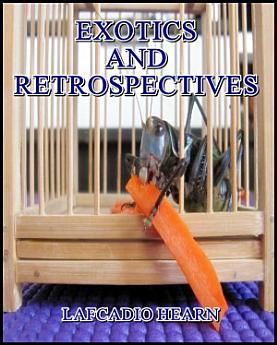Exotics and Retrospectives
За е-книгава
The regular trade in musical insects is of comparatively modern origin. In Tōkyō its beginnings date back only to the Kwansei era (1789-1800),—at which period, however, the[49] capital of the Shōgunate was still called Yedo. A complete history of the business was recently placed in my hands,—a history partly compiled from old documents, and partly from traditions preserved in the families of several noted insect-merchants of the present day.
The founder of the Tōkyō trade was an itinerant foodseller named Chūzō, originally from Echigo, who settled in the Kanda district of the city in the latter part of the eighteenth century. One day, while making his usual rounds, it occurred to him to capture a few of the suzumushi, or bell-insects, then very plentiful in the Negishi quarter, and to try the experiment of feeding them at home. They throve and made music in confinement; and several of Chūzō’s neighbors, charmed by their melodious chirruping, asked to be supplied with suzumushi for a consideration. From this accidental beginning, the demand for suzumushi grew rapidly to such proportions that the foodseller at last decided to give up his former calling and to become an insect-seller.
Chūzō only caught and sold insects: he never imagined that it would be more profitable to breed them. But the fact was presently discovered by one of his customers,—a man named Kirayama, then in the service of the Lord Aoyama Shimodzuké-no-Kami. Kiriyama had bought from Chūzō severalsuzumushi, which were kept and fed in a jar half-filled with moist clay. They died in the cold season; but during the following summer Kiriyama was agreeably surprised to find the jar newly peopled with a number of young ones, evidently born from eggs which the first prisoners had left in the clay. He fed them carefully, and soon had the pleasure, my chronicler says, of hearing them “begin to sing in small voices.” Then he resolved to make some experiments; and, aided by Chūzō, who furnished the males and females, he succeeded in breeding not only suzumushi, but three other kinds of singing-insects also,—kantan, matsumushi, and kutsuwamushi. He discovered, at the same time, that, by keeping his jars in a warm room, the insects could be hatched considerably in advance of the natural season. Chūzō sold for Kiriyama these home-bred singers; and both men found the new undertaking profitable beyond expectation.
The example set by Kiriyama was imitated by a tabiya, or stocking-maker named Yasubei (com[51]monly known as Tabiya Yasubei by reason of his calling), who lived in Kanda-ku. Yasubei likewise made careful study of the habits of singing-insects, with a view to their breeding and nourishment; and he soon found himself able to carry on a small trade in them. Up to that time the insects sold in Yedo would seem to have been kept in jars or boxes: Yasubei conceived the idea of having special cages manufactured for them. A man named Kondō, vassal to the Lord Kamei of Honjō-ku, interested himself in the matter, and made a number of pretty little cages which delighted Yasubei, and secured a large order from him. The new invention found public favor at once; and Kondō soon afterwards established the first manufactory of insect-cages.






